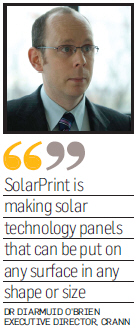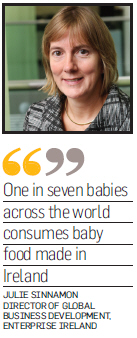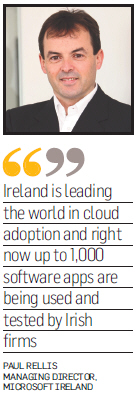JOHN KENNEDY looks at the industries of tomorrow that will put our economy back on the path to prosperity.
We’ve spent so much time looking back at what went wrong in Ireland that perhaps it’s apt to look forward and figure out what growth potential is left to allow us to one day shatter the shackles imposed by our new economic overlords.
You see, after the shock, anger and the recrimination, the fighting characteristic that makes us distinctly Irish must surely come out and more and more people will have to realise it’s going to be a team effort to put this country on the right trajectory.
“If you remove banking, construction and retail, most of the underlying economy is performing quite well,” explains Emmanuel Dowdall, IDA Ireland’s global divisional manager for content, consumer and business services.
“Exports are up 6pc, manufacturing output is up by 10pc. That’s coming from the productive element of the Irish economy and it’s not being reported. Where other countries’ exports are falling behind, Ireland’s are growing.”
It is important to give future generations of school leavers – and their parents – some ray of hope and allow them to prepare for the industries of the future. So here they are:
Medical devices and life sciences
Not many people realise this, but Ireland actually boasts the second-highest concentration of medical devices firms anywhere on the planet – outside of Idaho – and this is one of the few areas where there’s a strong proportion of indigenous companies like Creganna and Sigmoid operating alongside global players such as Boston Scientific or Covidien.
Gus Jones, IDA Ireland’s head of medical technologies, says that firms operating in the medical devices and life sciences areas are actually 95pc export oriented and there’s an even split between the number of indigenous and multinational firms in the medical devices sector.
“The sector in Ireland grew 9pc in the past year and it is a very stable area, presenting more opportunities than most people perceive.”
These opportunities in particular exist for science and engineering graduates and half of the operations in Ireland are R&D-oriented.
“If I was a parent advising a teenage kid today, the one thing I’d say is this sector is going to be with us for a long time. People are getting older and fatter. This creates a demand for new technologies, products and services, so there will be healthy growth in this sector for some time.”
Covidien, a leading global provider of healthcare products, celebrated its 20th anniversary in Galway this year. The company employs 2,000 people in Ireland and in October announced 200 new jobs in Dublin.
Covidien’s chief technology officer in charge of medical devices, Paul Hermes, says a revolution in healthcare is already under way and Ireland is playing a role.
“If you think about the fantastical scanners and non-invasive technologies portrayed in the Star Trek movies, well that stuff is happening in the 21st century. Twenty years ago, gall bladder surgery would hospitalise you for days, now it can be done in hours and there are treatments and technologies that can do that non-invasively. These are disruptive and very real in our industry.”
Hermes says that Covidien’s latest investments in Ireland were centred around the ability to work with local academic institutions here.

Nanotechnology
Nanotechnology, the science of ultra-micro electronics and pharmaceuticals at a sub-atomic scale, has the potential to be a major engine of growth in the Irish economy and exports could be doubled from €15bn today to €30bn by 2015.
The Centre for Research on Adaptive Nanostructures and Nanodevices (CRANN), based at Trinity College Dublin, has secured €8.1m in non-Exchequer funding over the past 12 months and has provided employment for more than 50 people.
While these 50 are just a fraction of the thousands of people working in electronics and pharmaceutical firms across the country, nanotechnology could make Ireland a leader in the future of technology and future wonder drugs.
Dr Diarmuid O’Brien, executive director of CRANN, says that already 10pc of Ireland’s exports are coming from products enabled by nanotechnology and these would transcend three core industries: ICT, medical devices and biopharmaceuticals.
“Companies like Intel are working on 65-nanometer transistors which are changing the entire future of computing. Firms in medical devices are seeking to make devices like stents, which are stronger and lighter, and, in the future, deliver drugs to patients in tiny nanoparticle packages. In terms of biopharmaceuticals, companies like Elan and Glaxo-SmithKline are looking at changing the dynamics in terms of what future drugs can do.
“Look at up-and-coming Irish technology companies like SolarPrint, for example, a firm making solar technology panels that can be put on any surface in any shape or size. A key ingredient in this is nanoparticles. We’re beginning to see a whole new generation of companies engaging in nanotechnology to create future computers or healthcare products and at the same time seeing more mature Irish indigenous businesses re-energise their business,” says O’Brien.

Food and agriculture
“Generally, one of the pluses of recessionary times is the upsurge in start-up companies,” says Enterprise Ireland’s director of global business development Julie Sinnamon.
Enterprise Ireland deals with 75 start-ups a year and she says it will be greater in 2011, particularly in areas like medical devices, life sciences and smart foods.
Sinnamon says that Ireland’s food sector represents one of the greatest areas for growth for the country.
“The growth opportunities in food are amazing. Danone, for example, has two baby food operations in Ireland and recently began expanding its Macroom operations.
“Not many people realise this, but 15pc of the world’s baby food formula is produced in Ireland. One in seven babies across the world consumes baby food made in Ireland. When the Danone project is completed, this will go to one in five babies in the world.
“The dairy sector alone is projected to grow 50pc between now and 2020.
“Ireland is now in a position to produce high-value end products. When you see a piece in the paper saying there are going to be 40 food jobs in Macroom, think of all the farmers collecting milk. It isn’t just about ICT and digital; even in traditional sectors like food we have strong science, R&D and growth potential,” she says.
The digital economy
The success of entrepreneurs like Dylan Collins in coming up with new technologies that have resulted in him selling two businesses to the world’s biggest games company Activision and to the world’s biggest games retailer GameStop respectively shows that young Irish people can be as good as any in Silicon Valley. We just need to believe.
Already believing is a Dublin-based technology company called Intune Networks. Intune’s technology enables telecoms firms to run different services – from e-commerce to high-definition gaming – to thousands of households on a single strand of fibre cable.
“People talk about smart grids and a smarter planet, but really what they are talking about is smart infrastructure,” says CEO Tim Fritzley. “The future of the internet is the internet of things, and the internet of things or the semantic web is primarily machines talking to machines with humans to guide them occasionally.”
IDA Ireland’s Dowdall says Ireland has a rare opportunity to capture a share of the digital games market, which means excelling in areas like social networking, high-definition TV and other core markets.
“The entire explosion in massively multiplayer games (MMRPG) which are built by players like Blizzard and Zynga is phenomenal and some of these companies are deriving revenues in excess of $1bn from advertising on social networks.”
Dowdall says that the assembly of global gaming firms such as EA Games, Activision, Goa Games, Gala Networks and Big Fish Games means Ireland effectively has captured the ‘heart and lungs’ of the gaming business.
“There are over 20 companies in the gaming space here and 80pc of what they are doing is services-related. Employment in the gaming business stands at around 2,000-plus, up about 400pc since 2002,” he says.
Collins, whose Dublin firm Jolt Online Gaming has developed a Facebook game for Hugh Heffner’s Playboy empire, believes that Enterprise Ireland’s creation of an Internet & Games Competitive Start Fund, with an initial pot of €500,000 to invest in 10 internet and games start-ups, is a step in the right direction.
“It is being piloted for an initial 10 companies and there’s an investment committee led by experienced entrepreneurs. If successful, it is my hope the model will be expanded. I’m sure start-ups will complain about form filling, but if they can’t fill in pieces of paper then they won’t be prepared for the hurdles that lie ahead,” says Collins.

Cloud computing
Like gaming, Ireland has again assembled the heart and lungs of the cloud industry. Google has major operations here, so too has Amazon.com and IBM, and last year Microsoft took the wraps off a massive $500m cloud computing data centre in west Dublin.
Microsoft Ireland managing director Paul Rellis says that more than 400 established Irish software companies are developing software on Microsoft’s Azure platform, it’s ‘Windows for the Cloud’, which will be hosted at the data centre.
Rellis says Irish companies aren’t laggards in cloud computing but are actually leaders.
“Ireland is leading the world in cloud adoption and right now up to 1,000 software apps are being used and tested by Irish firms.”
Green tech
Ireland could be a natural home for the future green technology industries, and our growing population of PhD graduates are not only enticing inward investment, but they also have the potential to spearhead indigenous companies of the future.
Martin Hynes of IRCSET has revealed that more than 256 PhD researchers have been distributed among a similar number of Irish businesses with a strong interest in R&D in a variety of areas.
“For example, Banagher Concrete is researching products for offshore wind turbines using anti-vibration techniques.”
According to Enterprise Ireland, the Irish clean-tech sector employs 6,800 people and its exports are valued at $4bn.
Ireland’s first green economic zone known as An tSlí Ghlas – The Green Way has forecast 10,000 jobs over the next five years in the green sector. Tony Boyle, chairman of the steering committee for An tSlí Ghlas – The Green Way, says that by creating an internationally recognised green economic zone, it could position Ireland as a leader in the world’s fastest-growing sector.
“The potential of this project, which builds on our existing assets and infrastructure, is that it can assist in the transformation of our economy,” affirms Boyle.